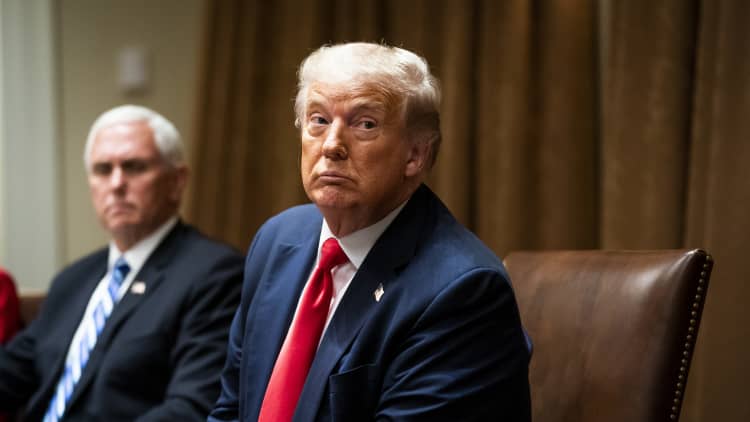
President Donald Trump on Saturday signed a series of executive orders expanding coronavirus economic relief to Americans struggling during the pandemic.
The president's four orders extend unemployment benefits, provide a payroll tax holiday, defer student loan payments through 2020 and extend the federal protections from evictions.
Trump's orders will quickly face a legal challenge, as continuing the programs would require federal funding, which Congress controls.
"We're going to save American jobs and provide relief to the American workers," Trump said during a press conference at his private golf club in Bedminster, New Jersey.
Trump said he will establish a payroll tax holiday through the end of the year to Americans earning less than $100,000 per year and instruct the Treasury Department to allow employers to defer payment of the employee portion of certain payroll taxes. However, there's no guarantee workers will receive that money.
Trump added that if re-elected in November, he would look to extend the deferral and "terminate" the tax, which funds Social Security and Medicare programs.
The president's orders also extend the weekly unemployment bonus at a reduced level of $400 per week, instead of the $600 per week federal unemployment insurance that was approved in March and expired at the end of July. Trump said states will need to cover 25% of the $400 weekly benefits.
Democrats have insisted they will not support a bill that does not extend the $600 per week benefit. Senate Republicans released a bill that would set the payment at $200 per week through September. Then, it would change to 70% wage replacement.
The White House previously offered a one-week extension of the $600 benefit and reportedly floated a $400 a week payment into December. Democrats refused the proposals.
"This is the money they need, this is the money they want, and this gives them a great incentive to go back to work," Trump said on Saturday, referring to the $400 in jobless benefits.
Treasury Secretary Steven Mnuchin and White House chief of staff Mark Meadows previously said they would recommend that Trump take executive action after their coronavirus aid talks with Democratic leaders made little progress.
After relief discussions ground to a halt on Friday, the Trump administration wanted to show it could act without Congress. It could be part negotiating tactic and part political play: Trump aims to boost his fortunes in an election where his failure to contain the virus has hurt his chances of winning.
Officials in Washington have faced pressure to boost an economy wrecked by the pandemic and inject resources into a health-care system struggling to handle waves of infections.
The eviction moratorium also lapsed in late July. The combination of the two lifelines ending left millions wondering how they will afford food and stay in their homes.
In a call prior to Trump signing the executive orders, House Speaker Nancy Pelosi told Democratic House members that the president's rental moratorium was "meaningless" without proper rental assistance, as people will have to eventually backpay rent.
Pelosi and Senate Minority Leader Chuck Schumer wrote in a statement that Trump's policy announcements provide little real help to people and cut vital unemployment benefits.
"We're disappointed that instead of putting in the work to solve Americans' problems, the President instead chose to stay on his luxury golf course to announce unworkable, weak and narrow policy announcements to slash the unemployment benefits that millions desperately need and endanger seniors' Social Security and Medicare," Pelosi and Schumer wrote.
Congress and the White House failed to extend the programs as they tried to negotiate a broader pandemic aid package. Jobless benefits were among the biggest sticking points.
Correction: The president's four orders extend unemployment benefits, provide a payroll tax holiday, defer student loan payments through 2020 and extend the federal protections from evictions. An earlier version misstated their intentions.



